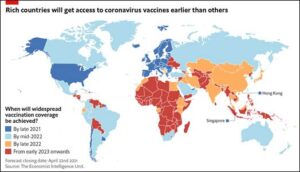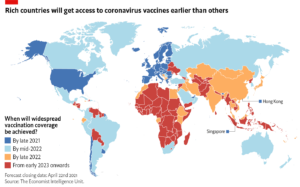JM Financial : Initiate coverage on MTAR with a BUY rating and TP of Rs. 1,150
The Economist Intelligence Unit (The EIU) has published its Q2 global forecast which outlines strategy, goals and risks behind Russia and China’s successful vaccine diplomacy drive. The report highlights that Russia and China are playing a long game with vaccine diplomacy, focusing on regions where they are courting favours, competing with Western powers, or where they have a limited presence.
By contrast, Western powers like the EU and the US have so far mostly been absent from the vaccine diplomacy scene.
You can find the press release and full report in the attached for your reference.
Agathe Demarais, The EIU’s global forecasting director and author of the report, says:
“With vaccine diplomacy, Russia and China seek to leverage resentment against Western countries, which have pre-bo oked more than half of the global supply of vaccines this year and are prioritising immunising their own popula tion s.v Vaccine diplomacy is not about sending shots as a one-off operation. Both Russia and China are establishing vaccine facilities across the world and training local workers from emerging countries, betting that such a strategy will boost their presence on the ground for decades to come. Western countries will only engage in vaccine diplomacy only later this year. This will likely be too late to catch up with that of Russia and China, which are winning the public relations battle.”
The Q2 global forecast also includes the latest forecasts for the rollout of COVID-19 vaccines, reflecting the time when countries may expect to have vaccinated the majority (60-70%) of their adult population. See below for the global vaccination timelines map.
If you would like to speak to Agathe or have any questions, feel free to contact us at EIU@sandpipercomms.com.
The EIU will also be hosting a webinar to discuss key findings from this report, particularly on the future of China and Russia’s vaccine diplomacy next Thursday, 6 May at 4pm SGT/HKT. Kindly register your interest here if you would like to attend the session.
Kind Regards,
Lee Jingyi
Western powers have lost the vaccine diplomacy battle
New report by The Economist Intelligence Unit (The EIU) outlines strategy, goals and risks behind Russia and China’s successful vaccine diplomacy drive.
- China and Russia have been sending millions of doses of coronavirus vaccines to developing states in recent months.
- Through this “vaccine diplomacy” operation, Russia and China aim to strengthen their global presence and boost relations with emerging countries.
- Russia and China are aiming to take advantage of a “vaccine vacuum”—a perceived failure of Western states to help in the provision of vaccines.
- Russia and China are playing a long game with vaccine diplomacy. Their intention is to cement their influence over the long term.
- Assistance in the form of vaccines will often come with economic or political strings attached.
- China and Russia are focusing on regions where they are courting favours, competing with Western powers, or where they have a limited presence.
- By contrast, Western powers like the EU and the US have so far mostly been absent from the vaccine diplomacy scene.
- It is likely that the damage to the reputation of Western countries has already been done and will be hard to repair.
With vaccine diplomacy, Russia and China are gaining leverage on the cheap while fulfilling commercial goals. In most cases, they are not donating vaccines, but selling them; in China’s case, state-ow ned firms are competing with private ones for the supply of shots.
China and Russia are focusing their efforts on regions where they are courting favours from emerging countries (for instance Asia for China), or directly competing with Western powers for influ ence (such as eastern Europe, and in particular the western Ba lkans, for both China and Russia), or in regions where they have only a limited presence so far (as is the case for Latin America, which is traditionally within America’s sphere of influence).
Vaccine diplomacy comes with risks. In Russia, and to a lesser extent also in China, conflicting priorities between vaccinating the domestic population and exporting shots will remain acute throughout 2021. To tackle this issue, both countries are opening additional factories (at home and abroad). However, it is unlikely that extra produc ti on lines will help to ease supply issues before the second half of 2021; setting up vaccine factories is technic ally challenging and it takes a minimum of six months before they are operational.
In the coming years, this will reinforce the global standing and lev erage of Russia and China in emerging countr ies, helping both co untries to gain influence and pursue their interests around the wo rld. The longer term con sequence of today’s vaccine diplomacy will be a further fragmentation of the global order.
Agathe Demarais, The EIU’s global forecasting director and author of the report, says:
“With vaccine diplomacy, Russia and China seek to leverage resentm ent against Western countries, which have pre-bo oked more than half of the global supply of vaccines this year and are prioritising immuni sing their own populations.”Ms Demarais adds that “Vaccine diplo macy is not about sending shots as a one-off operation. Both Russia and China are establishing vaccine facilities across the world and tr aining local workers from emerging countries, betting that such a strategy will boost their presence on the ground for decades to come.”
Finally, Ms Demarais mentions that “Western countries will only engage in vaccine diplomacy only later this year. This will likely be too late to catch up with that of Russia and China, which are winning the public relations battle.”
MAP OF GLOBAL VACCINATION TIMELINES:
Methodology:
This map depicts the latest forecasts from The EIU for the rollout of coronavirus vaccines, reflecting the time when co untries may expect to have vaccinated the majority (60-70%) of their adult population. Criteria taken into account in clude supply deals, production constraints, vaccine hesitancy, the size of the population, and the availability of healt hcare workers. The data are also adjusted by analysts to reflect specific conditions on the ground.
MAP OF RUSSIA AND CHINA’S VACCINE DIPLOMACY:
Download the EIU’s latest report here.
The Economist Intelligence Unit (The EIU) is the world’s leading resource for economic and business research, forecasting and analysis. It provides accurate and impartial intelligence for companies, government agencies, financial institutions and academic organisations around the globe, inspiring business leaders to act with con fidence since 1946. The EIU products include its flagship Country Reports service, providing political and ec onomic analysis for 199 countries, and a portfolio of subscription-based data and forecasting services. The company also undertakes bespoke research and analysis projects on individual markets and business sectors. More information is available at www.eiu.com
The EIU is headquartered in London, UK, with offices in more than 40 cities and a network of some 750 country experts and analysts worldwide. It operates independently as the business-to-business arm of The Economist Gr oup, the leading source of analysis on international business and world affairs.






